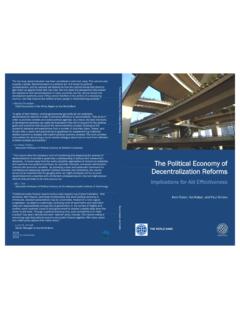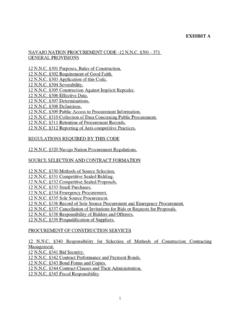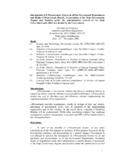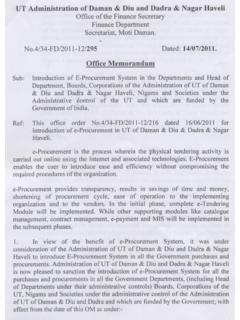Transcription of ETHIOPIA COUNTRY PROCUREMENT ASSESSMENT …
1 ETHIOPIA COUNTRY PROCUREMENT ASSESSMENT report , June 28, 2002 ETHIOPIA COUNTRY PROCUREMENT ASSESSMENT report volume I FINDINGS AND RECOMMENDATIONS June 28, 2002 (revised March 27, 2003) Africa Region Operational Quality and Knowledge Services The World Bank ETHIOPIA COUNTRY PROCUREMENT ASSESSMENT report , June 28, 2002 ii CURRENY UNITS Currency Unit = Ethiopian Birr US$ = Birr Ethiopian Fiscal Year = July 11- July 10 ABBREVIATIONS AND ACRONYMS AASWA Addis Ababa Water and Sewerage Authority ADB African Development Bank CBDSD Capacity Building for Decentralized Service Delivery CPIA COUNTRY Policy Institutional ASSESSMENT CSRP Civil Service Reform Program DFID department for international Development (UK)
2 ERA ETHIOPIA Road Authority EU European Union IBRD International Bank for Reconstruction and Development ICB International Competitive Bidding IDA International Development Association IDC Indefinite Delivery Contracts IS International Shopping LIB Limited International Bidding MEDAC Ministry of Economic Development and Cooperation (until year 2001) MFA Ministry Foreign Affairs MCB Ministry of Capacity Building MOE Ministry of Education MOF Ministry of Finance MOF-ED Ministry of Finance Economic Development (formerly MEDAC) MOI Ministry of Infrastructure MOWUD Ministry of Works and Urban Development (until 2001) MTSE Maritime Transit Service Enterprise (Ports) NBE National Bank of ETHIOPIA NBP No Bribery Pledge NCB National Competitive Bidding NFIA National Seeds Industry Agency NS National Shopping PSCAP Public Service Delivery Capacity Building program RELG Restructuring and Empowering Local Governments component RTA Road Transport Authority SIDA Sweden International Development Agency UDCBO Urban Development Capacity Building Office (formerly UDSS)
3 UDSS Urban Development Support Services (until 2001) ULGA Urban Local Government Authority (including Kebeles and Woredas) UNCITRAL United Nations Commission on International Trade Law ETHIOPIA COUNTRY PROCUREMENT ASSESSMENT report , June 28, 2002 iii PREFACE The COUNTRY PROCUREMENT ASSESSMENT report (CPAR) of ETHIOPIA is the result of the joint efforts of the Government of ETHIOPIA and the World Bank (WB) 1. It was carried out in close coordination with the Legal and PROCUREMENT departments of the Ministry of Finance and Economic Development (MOFED) and donors. The CPAR assesses the strengths and weaknesses of the COUNTRY 's PROCUREMENT policies, organization and procedures, and recommends suitable actions to improve the economy, efficiency, and transparency of the public PROCUREMENT system.
4 The CPAR team reviewed relevant Ethiopian laws and regulations and documents of other organizations, including World Bank internal documents, listed in Appendix 4 in the Attachment to the CPAR. The CPAR team is grateful for the cooperation and support by public officials and by the representatives of the private sector. A list of persons met is in Appendix 5 of the Attachment. The report contains (a) an Executive Summary highlighting the main issues of ETHIOPIA 's public PROCUREMENT system, and proposing an action plan for PROCUREMENT reform; (b) the Main report entitled Findings and Recommendations , and (c) an Attachment entitled Data and Analysis which include nine (9 )Annexes in a question and answer format on the legal, commercial and financial framework for public and private sector PROCUREMENT , consulting services, and PROCUREMENT performance in WB financed projects.
5 It also contains a Checklist of national PROCUREMENT procedures as compared to those practiced by IDA. 1 The CPAR was carried out during the period December 2001-April 2002, by a CPAR team, comprising officers of the Legal and PROCUREMENT departments of MOFED, led by Ato Wassihun Abate, and a World Bank Team, led by Francesco Sarno, Task Team Leader, (AFTQK) and including Messrs. Samuel Haile Selassie, Narayanaswami Viswanathan (consultant AFTQK) and Michael L. O. Stevens (AFTPR). Messrs. John Schwartz (consultant, AFTQK) and John Van Dick (consultant, WBIGS) made valuable contributions to the final draft of the CPAR volume I. volume II updates the CPAR of 1998 carried out by Sarno/ N.
6 Viswanathan. Peer reviewers were Robert Hunja (OPCPR), Frederick Krantz consultant, MNA Region, Peter Moll (AFTM1), Frederick Kilby (AFTM2), Duvvuri Subbarao (AFTM2) and Navin Girishankar (AFTPR). ETHIOPIA COUNTRY PROCUREMENT ASSESSMENT report , June 28, 2002 TABLE OF CONTENTS EXECUTIVE SUMMARY AND 1 Context of the CPAR .. 1 Findings of the CPAR .. 2 Recommended Action 6 Managing the Resistance to Change .. 7 1. 10 COUNTRY Setting .. 10 IDA Lending Portfolio .. 11 Government and donor participation in the preparation of the CPAR .. 12 2. 13 A. Public Sector .. 13 Legal and Regulatory Framework .. 13 From Bidding to Contract Award .. 14 Contract Administration .. 17 18 Audit and Anti-corruption Measures.
7 19 Performance of IDA-Financed 21 B. Private Sector and Trade Practices .. 22 3. RECOMMENDED ACTION 26 4. GENERAL RISK 28 ETHIOPIA COUNTRY PROCUREMENT ASSESSMENT report , June 28, 2002 1 EXECUTIVE SUMMARY AND RECOMMENDATIONS Context of the CPAR Background 1. ETHIOPIA is an important COUNTRY with a growing economy. It is a democratic federation of nine states, governed by a bicameral legislature with 656 representatives combined, a Prime Minister and a President. It receives substantial aid from the international donor community. It is the largest beneficiary in Africa of IDA funds, with $669 million committed in the IDA fiscal year ending June 31, 2001. In addition, ETHIOPIA receives significant bilateral assistance from Germany, Sweden, the European Union, Italy and the United States.
8 The UN has an extensive program in ETHIOPIA s education sector. A large number of international and local NGOs are active in the COUNTRY . 2. The approximate value of public PROCUREMENT of goods, works and consulting services financed by external assistance and external loans for the Ethiopian Fiscal Year [2002] is estimated at Birr 1, million (about US$ 208 million equivalent.) The approximate percentage of goods, works and consulting services financed by external agencies is 24%. With a GNP per capita of US$110, and the vast majority of its 60 million people living on less than US$1 per day, sound fiduciary management of public PROCUREMENT is, therefore, of primary importance to ETHIOPIA s economy. Currently the bulk of spending is still carried out by the federal Government, with the ministry of Defense in 2001/02 comprising a major part of the recurrent budget net of debt servicing and other special deductions.
9 On the capital budget side the ETHIOPIA Roads Authority (ERA)counts for just under half the provisions, followed by the Civil Aviation Authority. 3. Currently little spending takes place at the woreda level, and much of the latter' budgets are administered by zonal administrations, which are deconcentrated branches of regional government. the capacity of local governments to prepare and execute budgets and carry out PROCUREMENT varies. the more advanced regions have some capacity, emergent smaller regions very little. Likewise with local government, while major cities like Addis Ababa and Dire Dawa have been procuring for years on their own account, woredas have effectively no capacity.
10 In due course, direct woreda spending will rise following ETHIOPIA 's decentralization program. 4. ETHIOPIA is currently undertaking a radical program of decentralization of the powers and functions of the state to autonomous regional governments . These efforts, driven by a high degree of political commitment, are now being intensified through "second generation" reforms which are further decentralizing service delivery responsibilities to woredas, local governments entities within regions. this transformation of a formerly highly centralized and controlling central government has major capacity building implications, of which PROCUREMENT reform constitutes an important part. The overall framework for the reform is the National Capacity Building Program (NCBP) under the coordinating responsibility of the newly formed Ministry of capacity building.
















